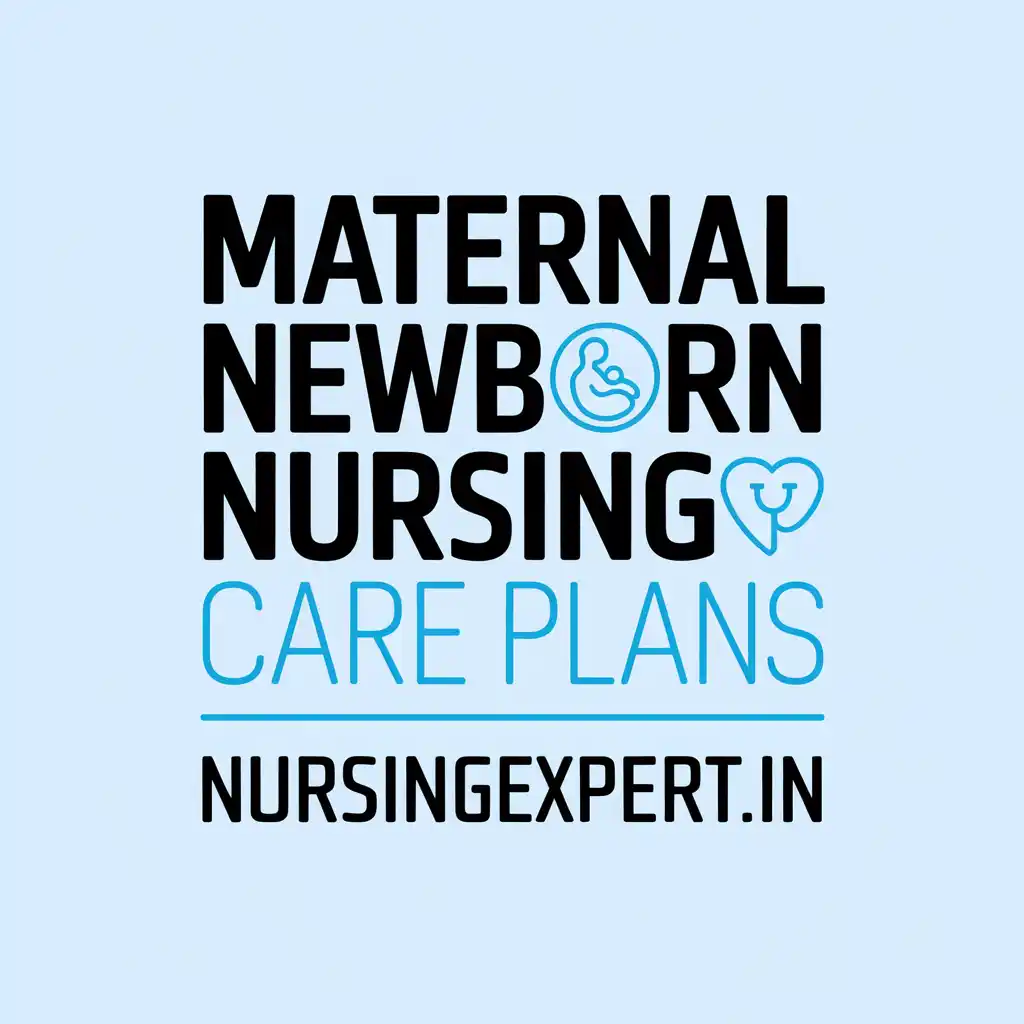

Nursing Care Plan for Maternal Newborn Care help nurses in caring for mothers and their newborns. These care plans ensure that both the mother and baby receive the best care during pregnancy, labor, delivery, and postpartum periods. This guide explains maternal newborn nursing care plans in clear, simple language. It offers detailed steps for assessment, nursing diagnosis, interventions, management, and evaluation. A downloadable PDF version is available for quick reference during clinical practice and exam preparation.
Thank you for reading this post, don't forget to subscribe!
2. Understanding Nursing Care Plan for Maternal Newborn Care
Definition
Nursing Care Plan for Maternal Newborn Care are written guides that help nurses manage care for mothers and their newborns. They include information on assessments, nursing diagnoses, goals, interventions, and evaluations. These plans cover both maternal care and newborn care.
Importance
These care plans are important because they:
- Ensure that mothers and newborns receive timely and appropriate care.
- Help nurses address specific issues such as postpartum pain, breastfeeding challenges, and newborn feeding.
- Provide clear instructions that reduce the risk of complications.
- Support communication among healthcare team members.
- Serve as valuable study tools for nursing students and professionals.
3. Key Concepts in Maternal and Newborn Care
Common Conditions
Mothers and newborns can face many health issues. Some common conditions include:
- Maternal Conditions: Postpartum hemorrhage, infections, pain, and depression.
- Newborn Conditions: Jaundice, feeding difficulties, weight loss, and respiratory distress.
Nursing Priorities
Nursing care plans prioritize:
- Stabilizing vital signs for both mother and baby.
- Preventing infection.
- Managing pain.
- Promoting safe feeding and nutrition.
- Supporting emotional and psychological well-being.
These priorities guide nurses in creating effective care plans.
4. Nursing Diagnosis for Maternal Newborn Care
Nursing diagnoses help identify the patient’s problems and guide interventions. Using NANDA guidelines, common diagnoses for maternal and newborn care include:
- Acute Pain related to postpartum recovery as evidenced by reported pain levels and physical assessment.
- Risk for Infection related to invasive procedures or postpartum changes.
- Ineffective Breastfeeding related to maternal discomfort or inadequate latch as evidenced by poor weight gain in the newborn.
- Deficient Knowledge regarding self-care and newborn care related to a lack of previous experience.
- Risk for Impaired Parenting related to stress and lack of support.
These diagnoses allow nurses to focus on the areas that need attention for both the mother and the newborn.
5. Nursing Interventions for Maternal Newborn Care
Nursing interventions are the actions taken to address the patient’s problems. For maternal and newborn care, key interventions include:
- Pain Management:
- Action: Administer pain medications and use non-drug methods such as warm compresses or relaxation techniques.
- Goal: Reduce pain and increase comfort for the mother.
- Infection Prevention:
- Action: Monitor for signs of infection, maintain proper hygiene, and follow aseptic techniques during procedures.
- Goal: Prevent infections in the mother and newborn.
- Feeding Support:
- Action: Assist with breastfeeding and educate on proper latch techniques.
- Goal: Ensure the newborn receives adequate nutrition.
- Emotional Support:
- Action: Provide counseling and support for postpartum depression and anxiety.
- Goal: Improve the mother’s emotional well-being.
- Vital Signs Monitoring:
- Action: Regularly check blood pressure, temperature, and heart rate for the mother, and monitor weight, feeding, and activity levels for the newborn.
- Goal: Detect any changes early and intervene promptly.
- Patient Education:
- Action: Teach the mother and family about self-care, newborn care, and when to seek help.
- Goal: Empower the family to manage health at home.
- Follow-Up Care:
- Action: Schedule regular follow-up visits and coordinate care with specialists.
- Goal: Ensure ongoing support and timely adjustments to care plans.
6. Nursing Management of Maternal Newborn Care
Nursing management involves coordinating all interventions and monitoring progress. For maternal newborn care, management includes:
- Initial Assessment: Quickly assess the mother’s and newborn’s vital signs, pain levels, and general condition.
- Ongoing Monitoring: Regularly check for changes in condition and update the care plan as needed.
- Medication and Treatment: Administer medications, such as pain relievers and antibiotics, as prescribed.
- Nutrition and Hydration: Support proper nutrition for both mother and baby.
- Education and Counseling: Provide clear instructions on self-care and newborn care.
- Interdisciplinary Collaboration: Work with physicians, lactation consultants, dietitians, and social workers to ensure comprehensive care.
- Documentation: Keep detailed records of assessments, interventions, and outcomes.
This management plan ensures both the mother and the newborn receive high-quality, continuous care.
7. Sample Nursing Care Plan for Maternal Newborn Care
Below is a sample Nursing Care Plan for Maternal Newborn Care.
| Assessment | Nursing Diagnosis | Goal/Expected Outcome | Intervention/Planning | Implementation | Rationale | Evaluation |
|---|---|---|---|---|---|---|
| Subjective Data: – Mother reports postpartum pain and fatigue. Objective Data: – Vital signs stable but mother appears tired; signs of mild infection in the perineal area. | Acute Pain related to postpartum recovery as evidenced by reported pain and physical findings. | Short-Term: – Within 1 hour, the mother’s pain will decrease from 8/10 to 4/10. Long-Term: – Within 48 hours, the mother will report manageable pain levels and improved energy. | Plan for pain management using prescribed analgesics and comfort measures (e.g., warm compresses). | Administer pain medications; apply warm compress; reassess pain every 30 minutes. | Reducing pain improves comfort and allows for better recovery and bonding with the newborn. | Pain score decreases; mother reports improved comfort and energy. |
| Subjective Data: – Mother reports difficulty breastfeeding and a feeling of frustration. Objective Data: – Newborn weight gain is slow; breastfeeding latch is poor. | Ineffective Breastfeeding related to maternal discomfort and difficulty with latch as evidenced by slow weight gain and reported challenges. | Short-Term: – Within 24 hours, the mother will demonstrate proper breastfeeding techniques with guidance. Long-Term: – Within one week, the newborn will show steady weight gain and effective feeding. | Develop a breastfeeding support plan; coordinate with a lactation consultant; educate on proper latch and positioning. | Provide hands-on breastfeeding guidance; schedule a session with a lactation consultant; offer written instructions. | Improving breastfeeding technique supports adequate nutrition for the newborn and reduces maternal stress. | Improved latch observed; newborn weight gain increases; mother reports increased confidence in breastfeeding. |
| Subjective Data: – Family expresses concern about the newborn’s feeding and the mother’s stress. Objective Data: – Mother appears anxious; family asks many questions about care. | Deficient Knowledge regarding newborn care and maternal self-care as evidenced by family uncertainty and anxiety. | Short-Term: – Within 24 hours, the mother and family will verbalize key aspects of newborn care and self-care. Long-Term: – Within one week, the family will adhere to the recommended care plan and follow up regularly. | Plan an education session on newborn care, maternal self-care, and signs to watch for. | Conduct one-on-one teaching sessions; provide visual aids and simple handouts; encourage questions and active discussion. | Education empowers the family to manage care at home and reduces anxiety. | Family demonstrates understanding; patient and family follow care recommendations; feedback indicates reduced anxiety. |
8. Patient and Family Education
Nurses must educate patients and their families about maternal and newborn care. Topics include:
- Understanding the Condition:
Explain what to expect during postpartum recovery and newborn care. - Breastfeeding Techniques:
Teach proper latch techniques and positions for effective feeding. - Pain Management:
Describe how to use medications and non-drug methods to manage pain. - Hygiene and Nutrition:
Offer advice on proper hygiene and a balanced diet to support recovery. - When to Seek Help:
Inform them of warning signs such as fever, excessive pain, or poor feeding that require prompt medical attention. - Follow-Up Appointments:
Stress the importance of regular check-ups with healthcare providers.
Clear education helps the family support both the mother and the newborn during recovery.
9. Interdisciplinary Collaboration
Maternal newborn care requires a team approach. Nurses should collaborate with:
- Physicians/Obstetricians:
To manage postpartum issues and monitor newborn health. - Lactation Consultants:
To assist with breastfeeding challenges. - Dietitians:
To plan nutrition for the mother and newborn. - Pharmacists:
To ensure safe medication use. - Social Workers:
To provide support and resources to the family. - Patient Educators:
To offer additional teaching on self-care and newborn care.
Collaboration ensures that all aspects of care are managed and the family receives comprehensive support.
10. Downloadable Maternal Newborn Nursing Care Plans PDF
For quick reference during clinical practice or exam preparation, download our complete Nursing Care Plan for Maternal Newborn Care PDF. This printable resource contains detailed care plans and additional guidelines for effective maternal and newborn care.
11. Frequently Asked Questions (FAQs)
1. What are maternal newborn nursing care plans?
Maternal newborn nursing care plans are written guides that help nurses manage care for mothers and their newborns. They include assessment, diagnosis, interventions, and evaluation.
2. Why are these care plans important?
These care plans ensure that both the mother and the newborn receive timely, effective care during the critical periods of pregnancy, delivery, and postpartum recovery.
3. What common issues do these care plans address?
They address issues such as postpartum pain, breastfeeding challenges, nutritional support, and infection prevention, among others.
4. What is the purpose of a 7‑column care plan?
A 7‑column care plan organizes information into clear sections: assessment, nursing diagnosis, goals, interventions, implementation, rationale, and evaluation. This format makes it easier to follow and apply in clinical settings.
5. How do I use the downloadable PDF?
You can download the PDF to use as a quick reference during clinical shifts or for exam preparation. It contains all the detailed care plan information and guidelines.
12. Conclusion
A well-developed maternal newborn nursing care plan is essential for ensuring quality care for both mothers and newborns. By using clear, structured steps—from assessment and diagnosis to targeted interventions and ongoing evaluation—nurses can effectively address the unique needs of this population. Education and interdisciplinary collaboration are key to empowering families and ensuring a smooth recovery. This guide provides a complete resource, including a sample 7‑column care plan, FAQs, and references. The downloadable PDF version offers quick access to these essential guidelines.
A structured care plan improves outcomes and supports both maternal and newborn health. It also helps nursing students and professionals prepare for exams and clinical practice. Use this guide to enhance your skills and provide the best possible care.
13. References and Sources
- American Nurses Association (ANA). (2022). Nursing Scope and Standards of Practice. Retrieved from https://www.nursingworld.org/
- Mayo Clinic. (2023). Maternal and Newborn Care: Postpartum Health. Retrieved from https://www.mayoclinic.org/
- MedlinePlus. (2023). Newborn Care. Retrieved from https://medlineplus.gov/newborncare.html
- NANDA International. (2022). NANDA Nursing Diagnoses: Definitions and Classifications. Retrieved from https://www.nanda.org/
- Centers for Disease Control and Prevention (CDC). (2023). Maternal Health. Retrieved from https://www.cdc.gov/reproductivehealth/maternalinfanthealth/index.html


